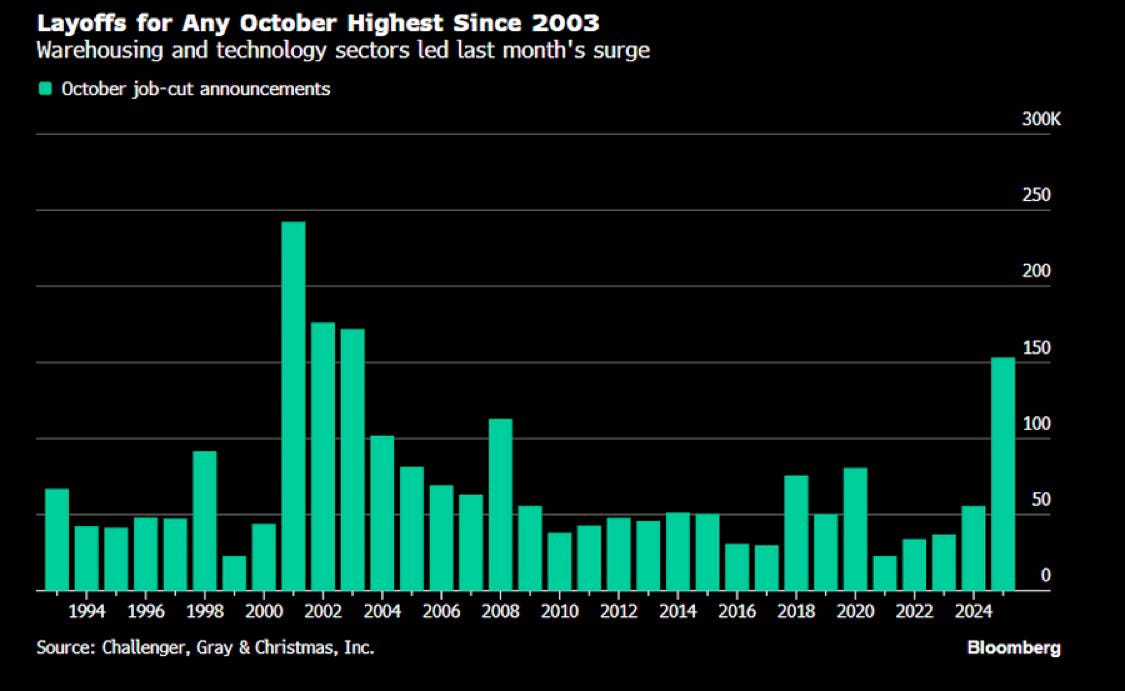🌀🗞 The FLUX Review, Ep. 214
November 6th, 2025

Episode 214 — November 6th, 2025 — Available at read.fluxcollective.org/p/214
Contributors to this issue: Wesley Beary, Ade Oshineye, Erika Rice Scherpelz, Ben Mathes, Stefano Mazzocchi, Dart Lindsley, Neel Mehta, Boris Smus, MK
Additional insights from: Anthea Roberts, Jasen Robillard, Justin Quimby, Lisie Lillianfeld, Robinson Eaton, Spencer Pitman, and the rest of the FLUX Collective
We’re a ragtag band of systems thinkers who have been dedicating our early mornings to finding new lenses to help you make sense of the complex world we live in. This newsletter is a collection of patterns we’ve noticed in recent weeks.
“There is nothing noble in being superior to your fellow man; true nobility is being superior to your former self.”
— Ernest Hemingway
😣♟️ When every move has a cost
There’s a scenario every leader dreads: when every move puts you in a worse position. You’re pinned, but waiting feels just as dangerous. You move, you lose. You don’t move…you lose slowly.
That’s zugzwang: a chess term for when every move worsens your position. In games, you can mathematically define this point. In real life, there’s no perfect information, no singular board. Just shifting situations where even doing nothing is a choice.
Another tricky situation is when life gives you a saddle point. At this critical threshold, some directions seem to lead up, others down, but no direction is neutral. The present is unstable and any move commits to a direction, but the long-term direction of the gradient is hard to detect.
Organizations hit saddle points more often than they realize:
You outgrow your current strategy, but the new one is unproven.
Your competitors move, but you don’t have enough signal to justify a big shift.
You consider a reorg, but you know it could backfire just as easily as succeed.
The human tendency to over-anticipate makes this even more challenging. We move early to gain an advantage, but acting too soon can trap us in a new, worse terrain, especially when our commitment prompts others to respond.
This is why war games and scenario planning exist. Not to predict, but to simulate: to explore how hard it is to recover from being wrong.
Yet sometimes you must commit despite uncertainty. And if the very possibility of reversing your decision can endanger it, you might take the extreme option of burning the ships, making going back impossible. You turn a local maximum—where you’re stable but stuck—into a local minimum in a new direction. It forces motion. It says, we’re committed now. It is irreversible, but it also redraws the map.
In systems with emotional, political, or resource asymmetry, movement costs are never evenly distributed. Defending home ground is easier in some ways (your troops and supplies are already there), but uncountably more costly psychologically because the damage is personal and retreat feels like collapse.
What these situations share is that the first move isn’t choosing the best path; it’s recognizing the terrain and realizing that sometimes the best you can do may still not be good enough. Even n-ply thinking has its limits.
🛣️🚩 Signposts
Clues that point to where our changing world might lead us.
🚏🇦🇺 Australians will get 3 hours of free electricity a day thanks to solar power
A solar panel boom in Australia has created an energy glut in the middle of the day: wholesale prices are very low or even negative during that period. As a result, the federal government is now requiring utility companies to provide customers with free electricity for at least three hours a day. Households with ‘smart meters’ will be allowed to run appliances such as AC units, washers, and dryers for free during that period. The idea is that power demand will be shifted to this cheap period, thereby reducing demand in the peak evening hours, when power would be more expensive and potentially less renewably generated.
🚏🤑 The Coinbase CEO trolled prediction markets by saying random words in an earnings call
A hot new offering on ‘prediction market’ sites like Kalshi is “mention markets,” where people can bet on which words someone will use in a public forum, such as an earnings call. Coinbase’s CEO apparently saw one of these mention markets and decided to mess with them, saying the following at the very end of his company’s latest earnings call: “I just want to add here the words Bitcoin, Ethereum, blockchain, staking, and Web3 to make sure we get those in before the end of the call.” (People seem to have been betting on whether he’d mention specific crypto keywords in the call, so he threw these non-sequiturs in at the end to scramble the markets.) Armstrong insisted it was just for fun, but Bloomberg warned that it showed how easily these markets can be manipulated, potentially opening the door to insider trading.
🚏🏢 October layoffs in the US hit their highest level in 22 years
American companies cut over 150,000 jobs in October, a striking 175% increase from last year and the most October layoffs since 2003. And overall, this year has been the worst for layoffs since 2009. The technology, retail, and service industries were the hardest-hit in the private sector; major reasons include AI, cost-cutting, and “belt-tightening” for both consumers and firms. In the public sector, the federal workforce has been getting slashed by layoffs.
🚏🎼 Musicians are suing Spotify over “billions” of fake plays from bots
A new class-action lawsuit is accusing Spotify of allowing “billions of fraudulent streams” generated by bots. Because Spotify pays artists out of a fixed pot of funds, these allegedly fraudulent listens would give the benefiting musicians a greater share of the money while depriving all other artists of royalties. Alleged examples of botting activity cited in the lawsuit include 250,000 streams of a Drake song that came from Turkey but were tunneled through British IPs “to obscure their origins;” some accounts listening to Drake’s music “23 hours a day;” and large amounts of streaming coming from places with “zero residential addresses” but presumably a lot of data centers.
📖⏳ Worth your time
Some especially insightful pieces we’ve read, watched, and listened to recently.
Seven Data-Driven Lessons From the 2025 Elections (Strength in Numbers) — Independent political statistician G. Elliott Morris derives some insights from the US’s off-cycle elections, which were held this Tuesday. He finds that a focus on affordability mattered more than ideology (a similar pattern to 2024), and that a lot of the “shifts” we saw last November, such as the voting patterns of Latinos and Gen Z, appear to have snapped back to long-term averages.
A Tool That Crushes Creativity (The Atlantic) — Charlie Warzel observes that the “SlopTok clones” like OpenAI’s Sora and Meta’s Vibes—populated by an endless feed of AI-generated short videos—are the logical conclusion of social media’s endless desire to minimize friction. But this frictionless mainlining of content into our brains leads to “a world of creativity without craft.” More broadly, “slop emerges when we eliminate not just toil (the burdensome aspects of work) but labor itself (the meaningful human engagement with creation).”
Why the World’s Biggest Film Bombed in America—and What That Says About Us (Steven Mintz) — Argues that Ne Zha 2’s massive success in China ($2.2 billion worldwide) but failure in America exemplifies the clash between Chinese epic storytelling and American narrative expectations of the linear individual triumph of a hero’s journey. The film’s rejection arguably reflects Hollywood’s declining ability to absorb and transform foreign cinematic traditions, a strength it once wielded to incorporate German Expressionism, Italian Neorealism, and Japanese samurai epics into its own idiom.
The Goodhart Trap in Politics (Dustin Moskovitz) — The Asana founder argues that many political candidates optimize their positions too much to match ‘what the data says,’ thus losing their authenticity—a sort of Goodhart’s Law trap. He proposes a 2x2 matrix of candidates: boring vs. passionate, and data-informed vs. conviction-driven; those who maintain conviction and authenticity tend to succeed, even if their résumés are thin. That holds true across the political spectrum, from Zohran Mamdani to Trump.
📚🧸 A reading list for young systems thinkers
Long before we learn the language of systems thinking, many of us encounter its ideas in stories. The best children’s and young adult books entertain while expanding our minds. Here are some books that—in hindsight—helped us on our journey.
If You Give a Mouse a Cookie by Laura Numeroff
A classic, step-by-step causal loop diagram disguised as a bedtime story. Each action generates the next in an accelerating feedback loop until the system returns to its point of origin. It’s a perfect sketch of how a system can be driven by its own outputs—and it all comes back to milk and cookies.
A Wrinkle in Time by Madeleine L’Engle
Through the cold, synchronized sameness of Camazotz, the lush diversity of Uriel, and the emotional richness of the Happy Medium, we glimpse the danger of excessive legibility. When order is total it erases life’s joyful, organic variability.
The Giver by Lois Lowry
Jonas’s community is a closed system that achieves order by ruthlessly minimizing variety and suppressing memory, showing the trade-off between stability and resilience, and the high price of legibility and ‘optimization.’
Lord of the Flies by William Golding
A vivid portrait of social feedback loops: the breakdown of order starts small. A lack of structure and a failure of communication reinforces fear and irrationality. This, in turn, leads to further erosion of rules and increased violence, resulting in savagery.
The Neverending Story by Michael Ende
A recursive tale where the in-book reader becomes a key player in the story. The boundary between observer and system dissolves, evoking the dichotomy of “quantum vs. classical” observers without ever mentioning either.
The Thirteen Clocks by James Thurber
After an evil duke slays time itself, life and love re-emerge only when the prince restarts the clocks. The tale contrasts the rigidity of mechanical order with the resilience of living systems, where love and nonsense are critical.
© 2025 The FLUX Collective. All rights reserved. Questions? Contact flux-collective@googlegroups.com.

